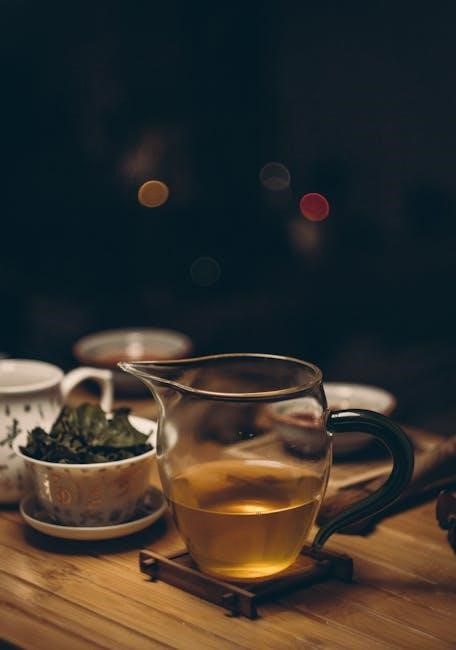Herbal tea‚ also known as an herbal infusion‚ is a caffeine-free beverage made from flowers‚ herbs‚ and fruits. It’s popular for its health benefits and relaxation properties.
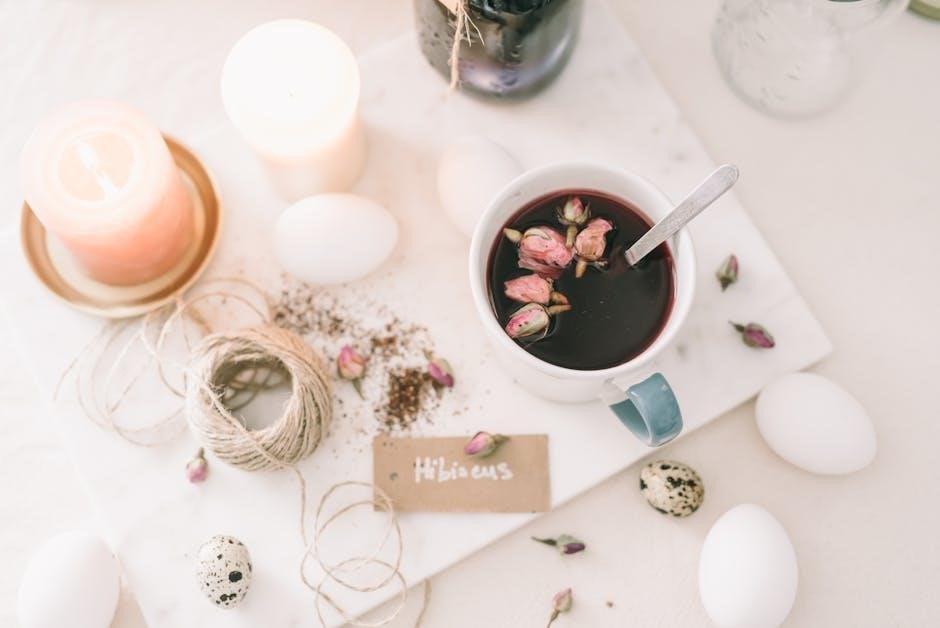
History of Herbal Tea
Herbal tea has a rich history dating back thousands of years. Ancient civilizations‚ such as the Egyptians and Chinese‚ used herbal infusions for medicinal and spiritual purposes. In Egypt‚ herbs were used in rituals and for health‚ while in China‚ herbal tea was a cornerstone of traditional medicine. The practice spread to Europe during the Middle Ages‚ where monasteries preserved herbal knowledge. By the 17th and 18th centuries‚ herbal teas became popular in England as health remedies. The 20th century saw the rise of commercial herbal teas‚ blending global herbs for unique flavors and benefits. Today‚ herbal tea is enjoyed worldwide‚ cherished for its cultural significance and natural wellness properties.
Types of Herbal Tea
Herbal teas are diverse‚ with popular varieties like chamomile‚ peppermint‚ and hibiscus. They are categorized into floral‚ spicy‚ and fruity types‚ each offering unique flavors and benefits.
Popular Herbal Tea Varieties
Chamomile tea is renowned for its calming effects and soothing aroma‚ often consumed before bed. Peppermint tea‚ with its refreshing flavor‚ aids digestion and energizes the mind. Hibiscus tea‚ known for its vibrant red color‚ is rich in vitamins and minerals‚ offering a tangy‚ fruity taste. Lemon balm tea provides a light‚ citrusy flavor and is praised for its stress-relieving properties. Echinacea tea is popular for its immune-boosting qualities‚ while rosehip tea delights with its sweet‚ berry-like flavor and high antioxidant content. Each variety offers unique health benefits and flavor profiles‚ making herbal teas a diverse and appealing choice for many;
Regional and Cultural Herbal Teas
Herbal teas are deeply rooted in regional traditions and cultural practices worldwide. In South Africa‚ Rooibos tea‚ made from the leaves of the Rooibos plant‚ is a caffeine-free staple. Europe often enjoys fruit and spice blends‚ such as Germany’s blueberry and orange teas. Japan celebrates mugwort tea for its earthy flavor and health benefits. India’s Ayurvedic tradition offers teas like tulsi and ginger‚ while the Middle East favors sage and anise for their hospitality rituals. Each region’s unique herbal teas reflect local customs‚ ingredients‚ and values‚ showcasing the diversity of global herbal traditions and their significance in cultural heritage. These teas not only provide flavor but also embody centuries of wisdom and sustainability.
Benefits of Each Type
Herbal teas offer a variety of health benefits depending on their ingredients. Chamomile tea is renowned for its calming effects and ability to improve sleep quality. Peppermint tea aids digestion and relieves nausea‚ while hibiscus tea is known to lower blood pressure and support heart health; Ginger tea reduces inflammation and eases menstrual cramps‚ making it a popular choice for pain relief. Echinacea tea is often consumed to boost the immune system and fight off colds. Each type of herbal tea caters to specific health needs‚ providing natural solutions for common ailments. By selecting the right blend‚ individuals can harness the unique properties of these plants to enhance their well-being and overall health.
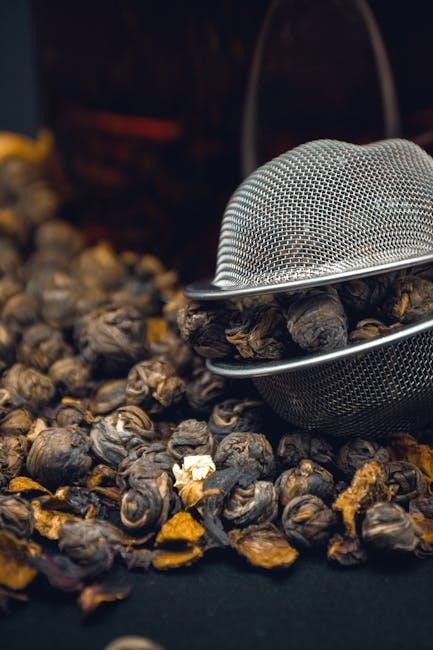
Health Benefits of Herbal Tea
Herbal tea offers numerous health benefits‚ including reducing inflammation‚ improving digestion‚ and boosting the immune system. It promotes relaxation‚ supports heart health‚ and may aid in weight management naturally.
Immune System Support
Herbal teas are renowned for their ability to strengthen the immune system. Certain varieties‚ such as echinacea and elderberry tea‚ are packed with antioxidants that combat free radicals and reduce oxidative stress. Ginger tea is known for its anti-inflammatory properties‚ which help protect against infections. Turmeric tea‚ rich in curcumin‚ supports immune function by fighting pathogens and reducing inflammation. Additionally‚ herbal teas like peppermint and lemon balm promote hydration and provide essential vitamins and minerals‚ further bolstering the body’s defenses. Regular consumption of these teas can enhance overall immune health and reduce the risk of illnesses like the common cold and flu. Many herbal teas also contain polyphenols‚ which play a significant role in boosting the immune system naturally.
Mental Health and Relaxation
Herbal teas are a natural way to support mental health and promote relaxation. Chamomile tea is renowned for its calming effects‚ reducing stress and anxiety while improving sleep quality. Lavender tea also fosters relaxation‚ helping to ease tension and promote a peaceful mindset. Adaptogenic herbs like ashwagandha and tulsi balance stress hormones‚ enhancing mental clarity and reducing anxiety. Passionflower and valerian root teas are known for their sedative properties‚ aiding in restful sleep and emotional well-being. These teas provide a holistic approach to mental health‚ offering comfort and tranquility without the side effects of synthetic remedies. Incorporating them into your daily routine can lead to improved mood‚ reduced stress‚ and a sense of calm‚ making them an excellent choice for supporting mental wellness naturally.
Digestive Health
Herbal teas are a natural remedy for supporting digestive health. Peppermint tea is known to ease indigestion‚ bloating‚ and cramps by relaxing the muscles in the digestive tract. Ginger tea aids in reducing nausea and inflammation‚ while also stimulating digestion. Chamomile tea soothes the stomach‚ alleviating symptoms of irritable bowel syndrome (IBS) and promoting a calm digestive system. Dandelion tea supports liver and gallbladder function‚ enhancing the body’s ability to process nutrients. Fennel tea helps relieve gas and bloating‚ while lemon balm tea can improve appetite and reduce digestive discomfort. These teas provide a gentle‚ non-invasive way to maintain a healthy digestive system‚ making them an excellent addition to a balanced lifestyle focused on gut wellness and overall health.
How to Prepare Herbal Tea
Start with fresh‚ filtered water‚ and use one teaspoon of dried herbs per cup. Steep for 5-10 minutes‚ then strain and enjoy with honey if desired.
Steps to Brew the Perfect Cup
Brewing herbal tea is an art that requires attention to detail for optimal flavor and benefits. Start by selecting high-quality‚ organic herbs or tea bags. Heat fresh‚ filtered water to a simmer‚ as boiling water can destroy delicate herbal compounds. Pour the water over one teaspoon of dried herbs or one tea bag per cup. Allow the mixture to steep for 5-10 minutes‚ depending on the herb’s strength and your desired flavor profile. Stir gently during steeping to release all flavors and nutrients. Strain the herbs or remove the tea bag‚ then enjoy your tea hot or iced. For enhanced flavor‚ add a drizzle of honey or a squeeze of lemon. Adjust steeping time and ingredients to personalize your perfect cup.
Tools and Equipment Needed
To prepare herbal tea‚ you’ll need a few essential tools. A clean teapot or mug is a must‚ preferably made of glass or stainless steel to preserve flavors. A tea infuser or strainer is handy for loose herbs‚ allowing easy removal after steeping. A kettle is necessary for heating water to the ideal temperature‚ typically between 160°F and 212°F. A measuring spoon or scale helps portion the right amount of herbs—usually 1 teaspoon dried or 2 tablespoons fresh per 8 oz of water. Optional items include a honey spoon for sweetening and a lemon wedge for added zest. For precise control‚ a digital thermometer can ensure the perfect water temperature. These tools enhance the brewing experience‚ making it both efficient and enjoyable.
Tips for Optimal Flavor
For the best herbal tea experience‚ use fresh‚ filtered water to prevent any off-flavors from tap water. Avoid boiling water‚ as it can destroy delicate flavors; instead‚ heat it to a simmer. Steep the herbs for the recommended time—usually 5-7 minutes for dried herbs and 7-10 for fresh—to release optimal flavor without bitterness. Covering the tea while steeping helps retain aromatic oils. For floral or fruit-based teas‚ a slightly cooler temperature (160°F–180°F) is ideal. Experiment with honey or lemon for sweetening‚ but add them after steeping to preserve nutrients. Store herbs in a cool‚ dark place to maintain freshness. By following these tips‚ you can unlock the full flavor and aroma of your herbal tea‚ ensuring a delightful and satisfying brew every time.
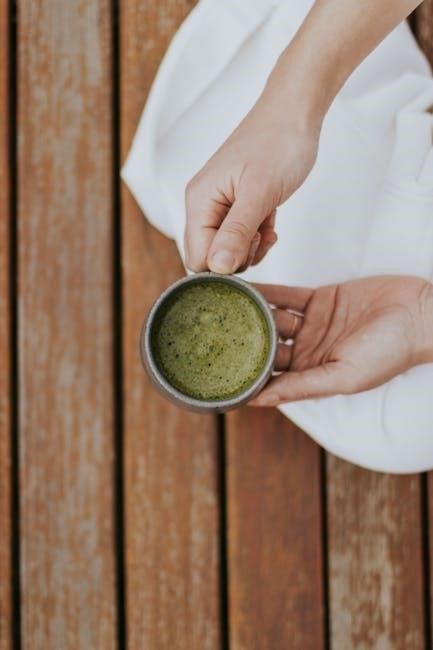
Safety Considerations
Herbal teas are generally safe but may interact with medications or worsen health conditions. Pregnant women and those with allergies should consult a healthcare provider before consumption.
Who Should Avoid Herbal Teas?
Certain individuals should avoid herbal teas due to potential health risks. Pregnant women‚ for instance‚ should avoid teas like rue or pennyroyal‚ as they may stimulate the uterus or harm the fetus. People with allergies or sensitivities to specific herbs should also exercise caution. Those with chronic health conditions‚ such as kidney or liver disease‚ may need to avoid teas that could worsen their condition. Additionally‚ individuals taking medications should consult their healthcare provider‚ as some herbal teas can interact with prescription drugs. For example‚ ginkgo biloba may interfere with blood thinners‚ while St. John’s Wort can affect antidepressants. Always prioritize medical advice to ensure safe consumption.
Potential Interactions with Medications
Herbal teas can interact with certain medications‚ posing risks to health. For instance‚ ginkgo biloba may interfere with blood thinners‚ increasing bleeding risks. St. John’s Wort can reduce the effectiveness of antidepressants‚ contraceptives‚ and other drugs by altering liver enzyme activity. Chamomile‚ while calming‚ may enhance the effects of sedatives and anesthetics. Additionally‚ herbs like ginger and turmeric‚ while beneficial‚ can interact with diabetes medications or blood pressure drugs. Individuals taking prescription medications‚ especially those with chronic conditions‚ should consult their healthcare provider before consuming herbal teas regularly. Such interactions highlight the importance of cautious use to avoid adverse health outcomes. Always prioritize medical advice to ensure safe consumption and prevent potential complications.
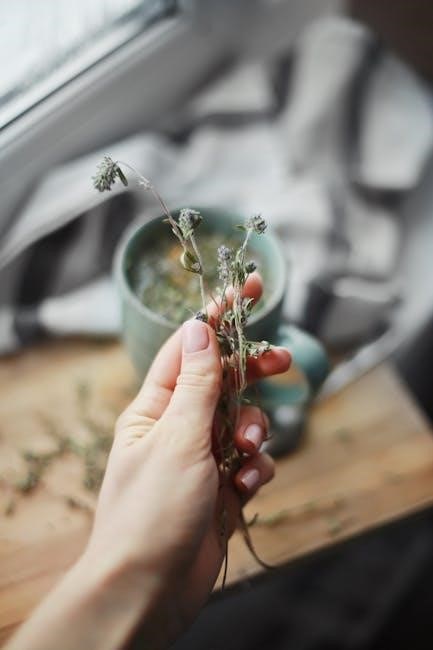
Common Questions About Herbal Tea
Herbal tea is a popular topic‚ with many people asking about its benefits‚ safety‚ and preparation. One common question is whether herbal teas are caffeine-free‚ and the answer is yes‚ as they are made from herbs‚ not tea leaves. Another frequently asked question is about their safety during pregnancy‚ with certain teas like peppermint being safe while others‚ like raspberry leaf‚ should be avoided. People also wonder how herbal teas differ from traditional teas‚ with the key distinction being the absence of caffeine and the use of various herbs. Additionally‚ many inquire about the taste‚ which varies widely from floral to earthy‚ and how to choose the right one for their needs. These questions highlight the curiosity and interest in incorporating herbal teas into daily life for health and wellness.
Herbal tea offers a world of flavors and health benefits‚ making it a versatile choice for many. From calming chamomile to invigorating ginger‚ each variety provides unique advantages; Research highlights their immune-boosting and digestive properties‚ while also aiding relaxation. The absence of caffeine makes them suitable for all times of the day. To enjoy the best experience‚ use fresh ingredients and proper brewing techniques. However‚ it’s important to consult a healthcare provider before consuming herbal teas‚ especially for pregnant individuals or those on medication. With so many options available‚ herbal teas can be a delightful and healthy addition to your daily routine‚ promoting overall wellness and satisfaction. They truly are a natural gift‚ offering both comfort and nourishment in every sip.
